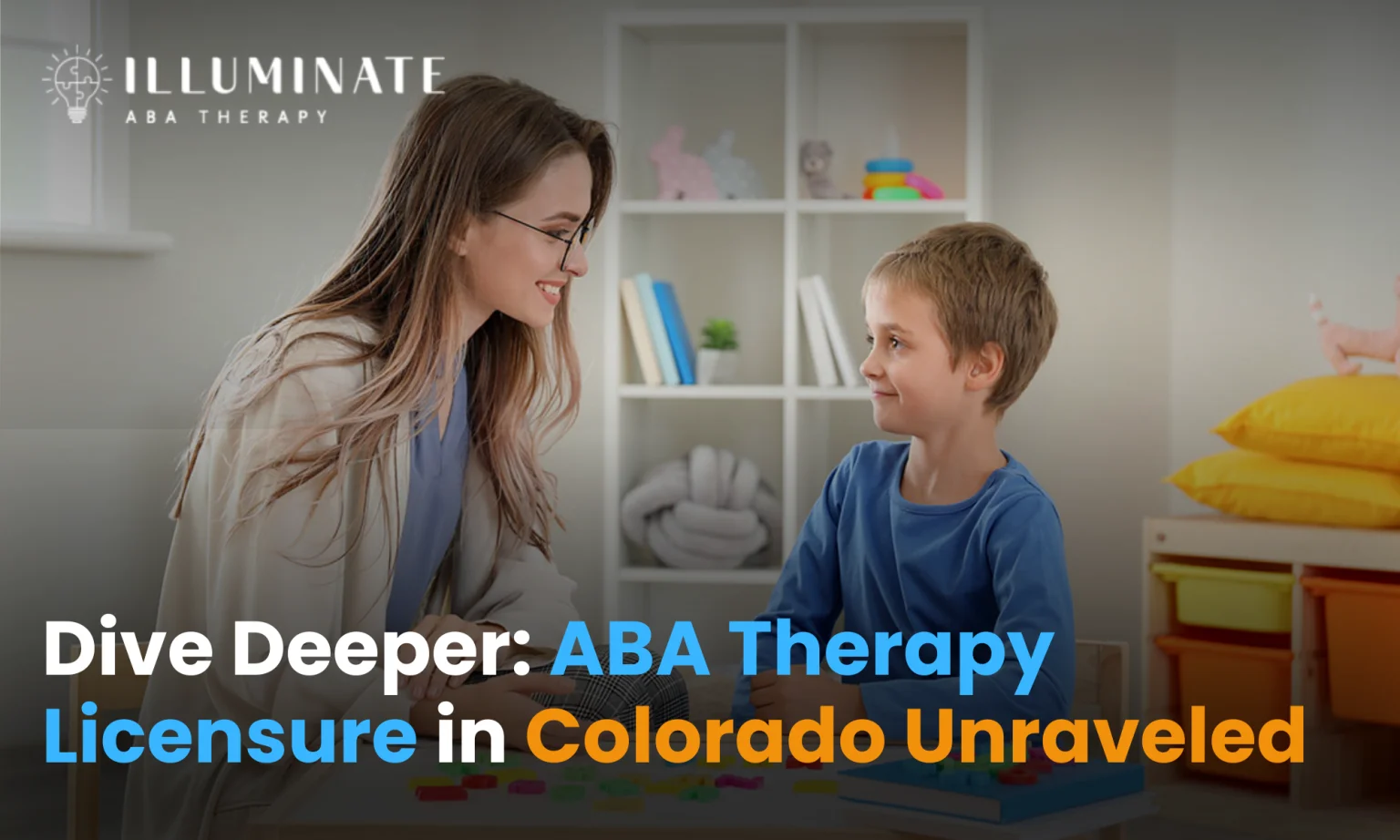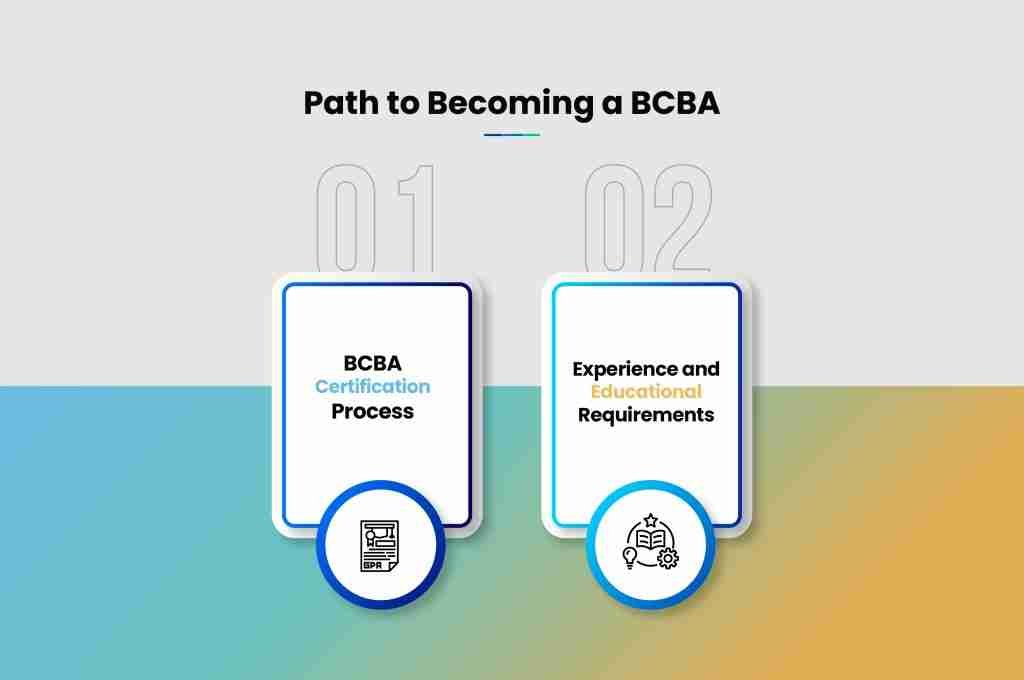Dive Deeper: ABA Therapy Licensure in Colorado Unraveled
ABA TherapyJuly 17, 2025

ABA Therapy Licensure Overview
So you're stepping into the world of ABA therapy in Colorado, huh? Let's break down what you really need to know about getting licensed and the regulations that come with it.
Colorado ABA Therapy Regulations
Colorado is a bit unique because it doesn't have its own separate licensing body for ABA therapists. Instead, it all falls under the umbrella of psychology. Basically, if you want to practice ABA therapy here, you're gonna need to get yourself a psychologist license from the Colorado Department of Regulatory Agencies. Yep, that means diving into the psychology pool, even if you're all about that ABA life.
Since there's no distinct license for ABA folks, rules for psychologists apply. This keeps everyone on the same ethical page and looks out for the public using ABA services.
Licensure Requirements in Colorado
To get your foot in the door of ABA therapy in Colorado, you’ll need that psychology license from the Colorado Department of Regulatory Agencies (DORA). Why? It's all about making sure people practicing ABA therapy have what it takes to do the job right and safely.
Now, back in 2017, there was talk about setting up specific license criteria just for ABA therapists in Colorado, but here's the kicker—that hasn't happened yet. So for now, psychologists remain the go-to professionals for ABA therapy.
Knowing what's up with licensing is pretty critical whether you’re looking to work in ABA therapy or find the right therapist for your family members. Staying clued up on the rules and requirements means ensuring that ABA therapy jumps through all the hoops for quality and effectiveness.
Path to Becoming a BCBA

Taking the steps toward becoming a Board Certified Behavior Analyst (BCBA) in Colorado is like picking your way through a maze, except this one has a clear goal in sight: helping folks with behavioral challenges get back on track. It's not just about books and tests, though that's a big part, but about following the rules set by the locals; or more formally, dealing with the BCBA certification process and meeting the needed experience and education benchmarks. Here we spill the beans on what this journey looks like.
BCBA Certification Process
If you want to call yourself a practicing BCBA in Colorado, you’ve got to play by the rules of the local gurus at the Colorado Department of Regulatory Agencies (DORA), who handle professional licenses. The biggie on your to-do list is passing the BCBA exam—it’s no walk in the park, but it’s your golden ticket to proving you get the knitty-gritty of behavior analysis. Nab that, and you’re showing you can handle the nuts and bolts of behavior therapy like a pro.
Once you’ve clinched your BCBA badge, you're not quite done—there's paperwork to shuttle over to the folks at DORA to get the official green light to start your practice. This bit makes sure you're fit to serve up top-notch care for folks needing behavioral tweaks.
Experience and Educational Requirements
In Colorado, the path to BCBA certification is peppered with a few hoops, especially on the school front. Bottom line: get yourself a master's degree or better in Behavior Analysis, Education, or Psychology from a properly vetted school as mentioned by Applied Behavior Analysis Edu. Your classes should be loaded with behavior analysis teachings so you're stepping onto the field well prepped.
Plus, anyone whipping up ABA therapy has to first snag a psychology license, making sure they tick all boxes set by DORA in looking after the public’s well-being. This rule book doesn’t just serve paper-thin purpose; it stands guard on keeping the quality high in behavioral treatment circles.
That said, the rule book's been finessed over the years, like when SB1212 showed up in 2014, and these licensure ins and outs keep getting a polish job to fit industry gold standards and make sure you've got your act together (AppliedBehaviorAnalysisEdu). This constant touch-up job highlights the ever-growing focus on setting a bar and hitting it in applied behavior analysis.
With this roadmap in hand—from acing the certification hurdles to locking down the nitty-gritty of education and hands-on know-how—you’re all set to launch a meaningful career as a BCBA, set to change lives for the better with some good, old-fashioned behavioral science at your fingertips.
Job Outlook in Colorado
Thinking about diving into a career as a Board Certified Behavior Analyst (BCBA) and calling Colorado home? Let me fill you in on what the scene's looking like these days. In 2023 alone, the Centennial State recorded a whopping 1,547 job openings for BCBAs. Clearly, there's a boom for pros who know their stuff and can make a difference in folks' lives.
Demand for BCBAs in Colorado
So, what's driving this hunger for BCBAs here? Well, ABA therapy has proven to be quite the game-changer for folks with autism and other developmental hurdles. The awareness about its effectiveness is skyrocketing, pushing the demand for well-versed BCBAs. Plus, remember 2015 when Gov. John Hickenlooper got the ball rolling with that autism insurance bill? It gave more folks access to ABA therapy, meaning more BCBAs are needed to lend a helping hand with behavioral intervention.
Average Salaries and Opportunities
Let's talk dough. In Colorado, you're looking at an average of about $80,225 if you're a BCBA. Got some years under your belt? Then you could be hitting the $90,000 mark. Of course, what you earn can change depending on things like your experience, where you work, and which part of the state you're in (Bright Pathways ABA).
Now, here's an interesting tidbit: Colorado hasn't nailed down a specific license just for BCBAs yet. Instead, you've got to snag a psychology license from the Colorado Department of Regulatory Agencies to practice ABA. A push for dedicated BCBA licensing kicked off back in 2017, but it hasn't come into play just yet.
Curious to take a deeper dive? Check out local ABA programs or continuing education options, so you can keep leveling up your skills as a BCBA. Keep your finger on the pulse of the ABA therapy vibe in Colorado, and you'll be all set to make savvy career moves in this fulfilling field.
Programs and Resources
Looking for ABA programs in Colorado for folks with autism means checking out what’s available to help their growth. Colorado’s got a bunch of programs that fit the needs of people on the autism spectrum. Also, keeping up with ongoing education is super important if you want to stay on top of the latest ABA therapy practices and breakthroughs.
ABA Programs in Colorado
The Master of Arts in Special Education focused on Applied Behavior Analysis (ABA) at CU Denver is a beefy program. It gets grads all set up to jump into ABA therapy and aim for being a Board-Certified Behavior Analyst (BCBA) or a Board-Certified Assistant Behavior Analyst (BCaBA). It mixes classes, electives, and practical work, making sure students get all the tips, tricks, and hands-on experience to tackle the BCBA exam (University of Colorado Denver).
The program’s all about getting pros ready for the Applied Behavior Analysis game. Key topics? You’ve got Introduction to ABA and Terminology, ABA Data, Ethics and Implementation, and Autism in Early Intervention. The folks teaching at CU Denver? They’re big names in special ed, teaching and pushing for betterment at every level—locally, across the state, and even internationally, amping up student learning bigtime.
Continuing Education Options
Ongoing learning in ABA therapy? It’s kind of a big deal. It keeps the brain gears turning on the freshest research, techniques, and tweaks in the field. CU Denver’s Graduate Certificate in Applied Behavior Analysis dishes out a solid course lineup that packs in the know-how and hands-on skills needed in ABA therapy. Want to jump in? Applications usually need to be in by April for summer classes and November for spring classes. The spots go to early birds who meet the criteria.
Grabbing on to these ABA programs in Colorado and not skipping out on continuing education lets folks in ABA therapy boost their skills, beef up their knowledge, and pitch in to help people with autism and similar developmental challenges. These programs and resources? They’re big players in helping practitioners grow and level up in their professional journey.
